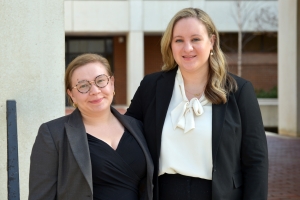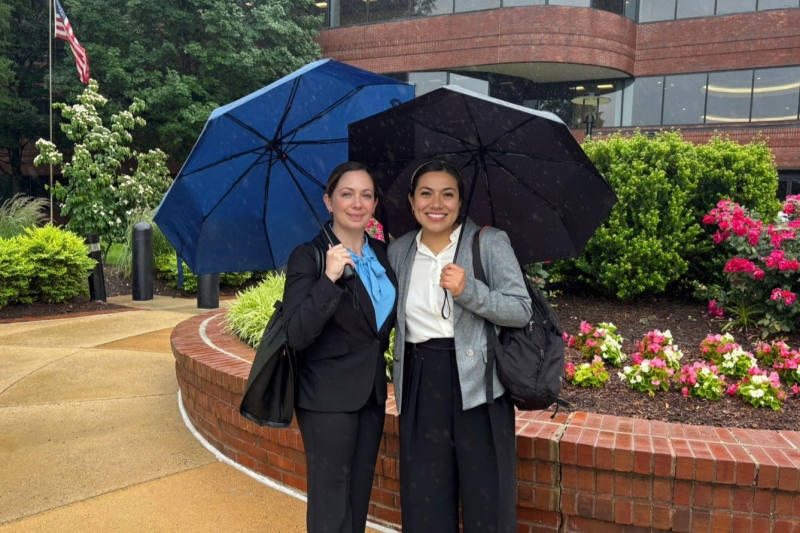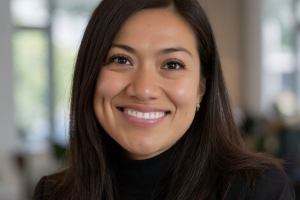
Immigrant Rights Clinic Prevails in Six Year Asylum Case The clinic secured asylum for a client who was persecuted in his home country for his political beliefs.
The Immigrant Rights Clinic at Washington and Lee University School of Law recently secured asylum for a client who was persecuted in his home country for his political beliefs.
The client’s quest began in 2019. After experiencing torture due to his political affiliations, he lawfully sought and began the long, uncertain process of seeking asylum in the U.S. The Immigrant Rights Clinic took his case shortly thereafter.
Student attorneys Maya Reddy ’21L and Elizabeth Drake ’21L, supervised by former clinic director Matt Boaz, were among the first to develop the case, gathering facts, building the evidentiary record, and guiding the client through initial screenings. Over the years, several different teams of W&L Law students worked on the matter, compiling more than 500 pages of evidence and documentation.
The claim was initially denied by an asylum officer, with the government citing outdated reports submitted in 2019 that suggested conditions in the client’s country had improved and that he would be able to return safely. The clinic gathered new information to challenge that assertion, as there was more evidence that more accurately reflected the client’s country’s political conditions had not improved and it would not be safe for him to return.
Immigration attorney Jessica Yañez has served as visiting director of the clinic this year. She worked with students Ana Laura Coria ‘25L and Silvia Montiel Morales ‘26L to develop additional evidence and prepare the client for a hearing in May, consulting with both a country conditions expert and a psychological expert. Coria was just two weeks past graduation and already beginning her preparation for the California bar exam when she paused to help represent the client in court.
“When I came in, we were preparing for a de novo review,” Coria explained. “That meant the court would not rely on the previous ruling but instead review the entire case anew. It gave us the opportunity to present updated evidence—particularly about current country conditions—and to build on the meticulous work done by the students who came before us.”
The court hearing was a unique experience for Coria. At the outset, the immigration judge initiated a competency hearing—not to evaluate the client’s mental state, but to determine whether procedural safeguards were necessary given the language barriers and high stakes. In the end, the judge ruled that the client’s previous testimony would be admitted into the record, sparing him the trauma of recounting his torture.
“We were able to begin with cross-examination,” Coria explained, “which limited the government’s ability to challenge the case, since they hadn’t submitted their own evidence and were constrained to the direct testimony already on the record.”
Coria admitted to being nervous during the hearing, not just because of the legal stakes, but because of growing reports of ICE detaining individuals at immigration court appearances. Despite that anxiety, she credited the unwavering mentorship of Professor Yañez, whose guidance and preparation helped steady her throughout the process. At the conclusion of the hearing and a brief recess, the judge granted the asylum claim. While the government can appeal the decision, Coria thinks that is unlikely and is gratified that their client will finally get a chance to continue rebuilding his life, but now outside of legal limbo.
For Coria, who helped with the case on a volunteer basis, the experience was a powerful reminder of what meaningful advocacy looks like.
“I always cautious about framing asylum as something to be “deserved,” as if protection from persecution is a reward instead of a legal right” Coria said. “To be a part of ensuring that our client received this legal protection was deeply affirming and it made me so happy. This was why I came to law school—to help people and to be of service.”
 Visiting Clinic Director Jessica Yanez and Ana Laura Coria ’25L outside the immigration court in Sterling, Virginia.
Visiting Clinic Director Jessica Yanez and Ana Laura Coria ’25L outside the immigration court in Sterling, Virginia.


You must be logged in to post a comment.